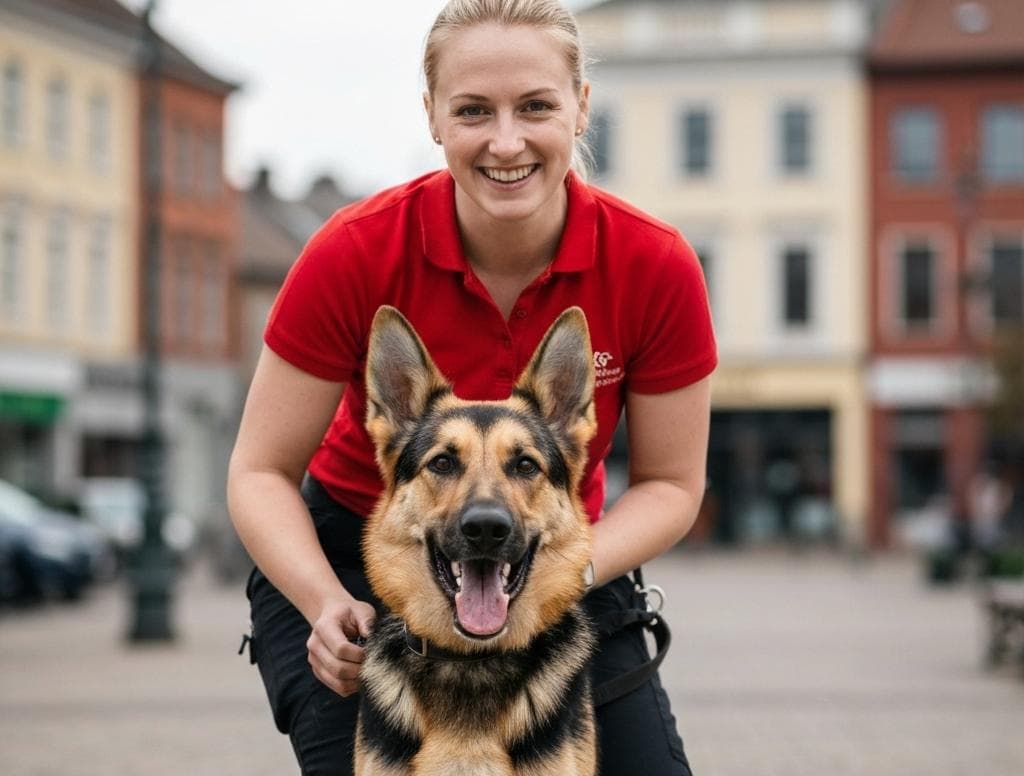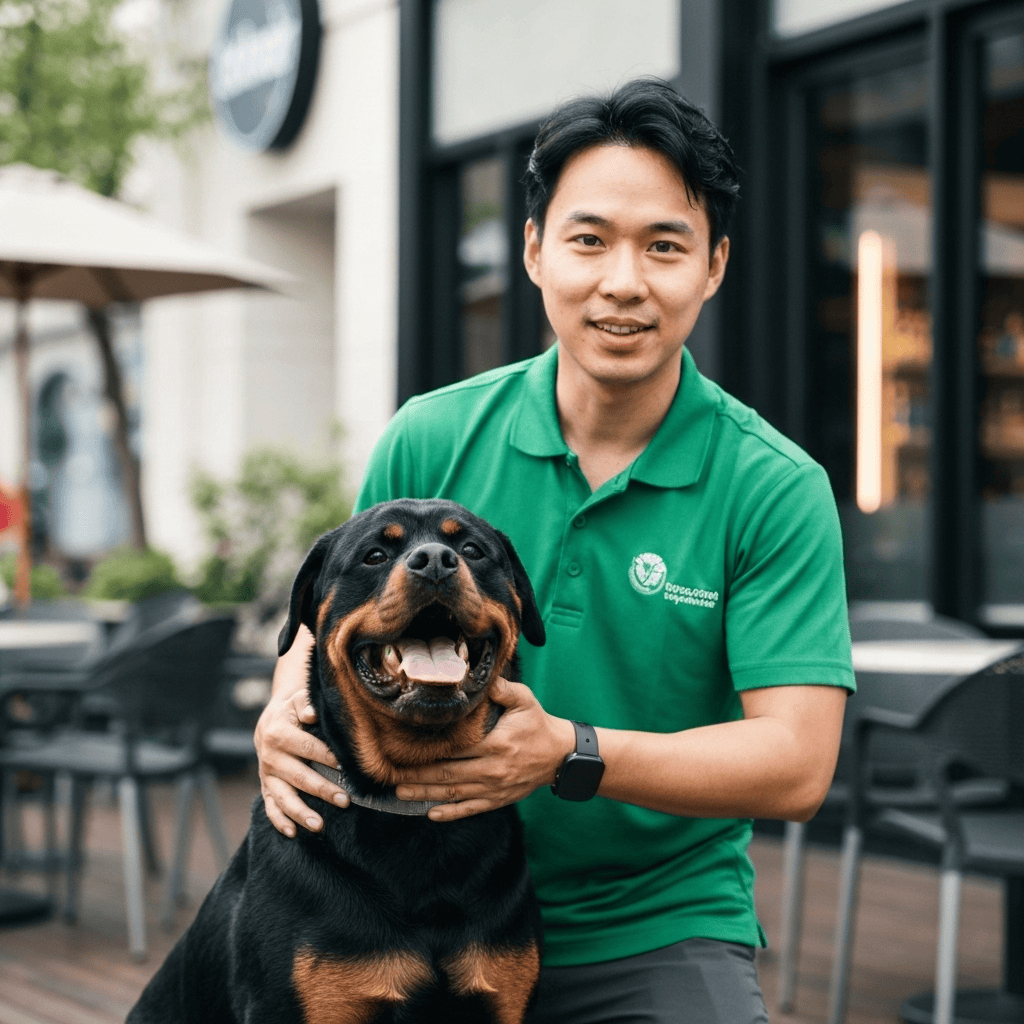Your Complete Guide to Choosing a Dog Trainer in Denton
Picture this: you’re walking your dog around the Denton Square on a busy Saturday morning. College students are heading to coffee shops, families are setting up for the farmers market, and your dog is calmly walking beside you, not pulling toward every distraction. That’s what good training can do for life in Denton.
Living here means your dog needs to handle campus crowds, busy sidewalks around the Square, and everything from peaceful neighborhood strolls to the excitement of festivals and events. The right trainer will help you build these real-world skills, whether you’re navigating the energy around UNT and TWU or enjoying quieter moments in places like Rayzor Ranch and Southridge.
How to Choose the Right Trainer
Start with their methods. You want a trainer who uses positive reinforcement and can clearly explain how they keep sessions encouraging rather than stressful. Ask them to describe how they’ll help your dog handle the specific challenges of Denton life, from patio dining Downtown to the distractions of delivery trucks and golf carts in neighborhoods like Robson Ranch.
Education matters, but don’t get lost in the alphabet soup of credentials. Look for trainers with recognized certifications like CPDT-KA, KPA-CTP, or CTC. These show they’ve committed to learning humane, science-based methods and staying current with best practices.
Think about where training happens. Many Denton families start with in-home dog training to work on house manners and basic skills in familiar surroundings. Once your dog has a foundation, you can practice in real situations around the Square, university areas, and local parks.
The best trainers will also tell you what they can’t help with. If your dog has serious aggression issues or complex behavioral problems, you want someone who knows when to refer you to a veterinary behaviorist or specialized professional.
Common Dog Training Methods Explained

Different approaches work better for different goals, but they should all focus on building skills that actually work in your daily life.
Basic obedience covers the essentials: sit, down, stay, loose-leash walking, and reliable recall. In Denton, this translates to a dog who can handle sidewalks during busy times, wait calmly at patio restaurants, and come when called even with campus distractions nearby.
Puppy training is all about setting up good habits early. The focus should be on socialization (helping your puppy feel comfortable with the sights and sounds of city life), potty training, leash training, bite inhibition, and crate training. Those first few months shape everything that comes later.
Behavior modification addresses bigger challenges like fear, reactivity, and separation anxiety. Good trainers use techniques like desensitization and counterconditioning rather than punishment to help dogs feel more confident and relaxed.
Group classes give you a budget-friendly way to practice around mild distractions and let your dog learn alongside others. Private lessons make sense when you need targeted help or have scheduling challenges. Day training programs can jump-start progress when a trainer works with your dog several times a week.
Board and train programs can be helpful in specific situations, but remember that you’ll still need coaching to maintain what your dog learned while they were away. And specialized programs like service dog training or therapy dog training require careful planning and clear standards from the start.
Average Cost of Dog Training in Denton (Updated for 2025)
Here’s what you can expect to pay for different types of training in the Denton area. Keep in mind that prices vary based on the trainer’s experience, travel time, and how long your program runs.
| Service Type | Average Cost (Denton Area) |
|---|---|
| Group dog training classes (4–6 weeks) | $160 – $300 total |
| Private lessons (60–75 minutes) | $95 – $170 per session |
| Puppy classes (4–6 weeks) | $160 – $280 total |
| Day training (trainer works your dog 3–5x/week) | $450 – $900 per week |
| Board and train (2–4 weeks) | $1,900 – $4,200 total |
| Behavior consultation (fear, reactivity) | $130 – $250 initial |
| In-home follow-ups (behavior cases) | $110 – $200 per session |
Many Denton trainers offer a brief free consultation by phone or video to discuss your goals and see if you’re a good fit. Just make sure you understand what’s included in any package before you commit to a program.
Local Rules, Permits, and Insurance in Denton
Understanding local regulations helps you train responsibly and avoid problems down the road.
Leash laws require dogs to be leashed and under control in public spaces throughout Denton, except inside designated off-leash dog parks. Always carry waste bags and clean up after your dog.
Vaccination requirements in Texas include current rabies vaccination for all dogs. You can find detailed information from the Texas Department of State Health Services at their rabies information page.
For local animal ordinances, noise complaints, and lost pet procedures, check the City of Denton's official website. They handle most day-to-day animal control issues within city limits.
Texas doesn’t require special licensing for dog trainers, so they operate under standard business regulations. Good trainers carry general liability insurance even though it’s not legally required. If your trainer holds classes in parks or rented spaces, they may need permits and proof of insurance from the property owner.
For questions about using city parks for training or events, contact Denton Parks & Recreation.
Local Denton Resources for Dog Owners
Knowing where to practice makes training more effective and enjoyable for both you and your dog.
Wiggly Field Dog Park at North Lakes Park offers separate areas for small and large dogs, plus nearby walking paths perfect for leashed warm-up exercises. The surrounding park areas also provide good spaces for practicing basic skills with moderate distractions.
Quakertown Park and the sidewalks around the Denton Square work well for calm, focused training sessions. You can gradually increase distractions as your dog gets more reliable with basic commands.
For longer training sessions and more space, try Ray Roberts Lake State Park’s Isle du Bois unit. The trails and open areas give you room to work on recall and loose-leash walking. Check current rules and fees at Texas Parks & Wildlife.
Lewisville Lake parks, managed by the U.S. Army Corps of Engineers, offer shoreline walks and picnic areas where leashed dogs are welcome. Find specific park information at their official site.
For vaccination clinics and general pet health resources, Denton County Public Health provides helpful information and sometimes hosts low-cost vaccine events.
Questions to Ask a Potential Dog Trainer
The right questions help you find a trainer who matches your goals and values:
- What training methods do you use, and how do you keep sessions positive and stress-free?
- What certifications do you hold, and how do you stay current with new research?
- How will you customize a program for my specific dog and our daily routine?
- Where will training sessions happen, and how will we practice skills in real-world situations?
- How do you measure progress and decide when to add more distractions?
- What exactly is included in your packages, and are there additional fees for travel or materials?
- Do you carry liability insurance, and can you provide proof?
- For behavior issues, do you work with veterinarians when medical factors might be involved?
- What will I need to practice between sessions to help my dog succeed?

Common Questions About Dog Training in Denton
How much does in-home dog training cost?
Most in-home sessions in the Denton area cost between $95 and $170 for 60 to 75 minutes. Trainers working on complex behavior issues may charge more because these cases require extra planning and safety considerations.
Is in-home dog training worth it?
Absolutely, especially for house-specific problems like door manners, window barking, or yard behavior. You’ll see faster progress because the trainer can set up realistic practice scenarios right in your home and neighborhood.
Can you pay someone to house train your dog?
Yes, many trainers offer puppy packages that include potty training guidance, crate training routines, and scheduling help. Success depends on consistent practice between visits, so expect daily homework assignments.
What is the 3-3-3 rule for dog training?
This guideline suggests that new dogs need about 3 days to decompress from change, 3 weeks to learn your routines, and 3 months to fully settle into their new life. Smart training programs follow this natural timeline to avoid overwhelming your dog.
How long will it take to reach my training goals?
Basic manners usually take 4 to 8 weeks with regular practice. More complex issues like reactivity or anxiety often require several months of careful behavior modification work.
What should I bring to group classes?
Pack a flat collar or harness, 6-foot leash, small high-value treats, water for your dog, and proof of rabies vaccination. Leave retractable leashes at home since they make it harder to manage your dog in class.
What’s the leash law in Denton?
Dogs must be leashed in all public areas except designated off-leash dog parks. You’re also responsible for keeping your dog under control and cleaning up waste. Check the City of Denton website for current details and any updates.
Do I need a dog license in Denton or Denton County?
Requirements vary by location within Denton County. Contact City of Denton Animal Services directly for current registration requirements, microchip policies, and any associated fees.
What shots does my dog need in Denton County?
Rabies vaccination is required throughout Texas. Your veterinarian will recommend additional core vaccines and preventive treatments based on your dog’s age, health, and lifestyle.
Are dog trainers required to be licensed in Denton?
No special license is required for dog trainers in Texas or Denton County. Focus on finding a professional dog trainer who uses humane methods, carries insurance, and has recognized credentials when possible.
Where can I practice off-leash recall?
Wiggly Field Dog Park provides a safe, fenced environment for recall practice with high-value treats. Keep sessions short and positive, and consider using a long training line until your dog is consistently reliable.
Which dog parks allow training around Denton?
Wiggly Field Dog Park allows casual training inside the fenced areas as long as you follow posted rules, keep sessions brief, and don’t disrupt other dogs and owners. Always give others plenty of space.
What trails allow dogs for training?
Ray Roberts Lake State Park welcomes leashed dogs on most trails, and Lewisville Lake day-use areas managed by the Corps of Engineers also allow leashed dogs in many locations. Always check posted signs when you arrive since rules can change.
Do trainers need permits to teach in parks?
Professional trainers conducting paid sessions or classes in public parks typically need permits and insurance documentation from the city or property owner. Ask your trainer how they handle these requirements with Denton Parks & Recreation.
Can a trainer help with dog aggression?
Yes, but look for someone with specific experience in behavior cases who uses humane protocols and will coordinate with your veterinarian if medication or medical evaluation might be helpful.
Training your dog for life in Denton means building skills that work in your real daily routine, from quiet neighborhood walks to busy events Downtown. With the right approach and trainer, you’ll have a well-behaved dog who can handle whatever Denton throws your way, making every outing more enjoyable for both of you.
